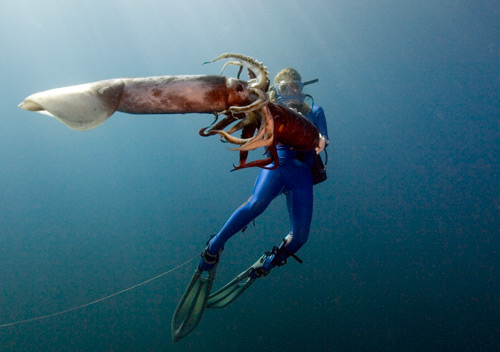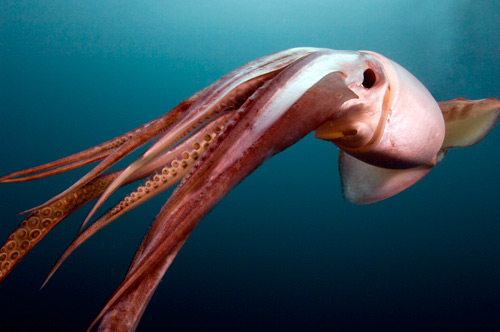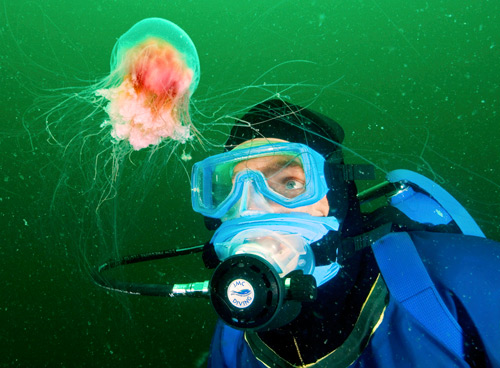When the Sea Reacts
By Jean-Michel Cousteau

I have traveled most of my life and have seen changes in the sea that no one, not even my brilliant father, could have predicted. Jacques Cousteau, however, did point the direction on many things—the danger of nuclear waste, overfishing, habitat destruction, even the high cost and negative effects of farming fish in the sea. In his later years he became quite concerned about the large-scale consequences of increasing carbon dioxide in the atmosphere and the inevitable warming of the climate.
We are becoming aware of the cumulative effects of how we live, but our influence can also be felt from a single incident that results in dramatic, unintended change. For example, it is now reported that in 1992, Hurricane Andrew, a Category 5 hurricane that caused $26.5 billion in damage and took 65 lives, also broke a single aquarium tank in Florida, washing half a dozen lionfish, a species native to the Indo-Pacific region, into the Atlantic Ocean.

Alien Invaders
It’s an incident that might have been noted only on an insurance claim except for the dramatic consequences: by 2007, those few lionfish had exploded into a population so large, healthy and aggressive that they were decimating the reefs of the Bahamas by eating juvenile fish of many species. A recent study claims that a single lionfish can kill three-quarters of a reef’s small fish population in just five weeks.
Now fishing and tourism in the Bahamas are actually threatened by the invasion and the best hope is that Bahamians and tourists develop a taste for this newly abundant fish. Some enterprising fishers and chefs are now serving lionfish in local restaurants. With a financial incentive, we may become the predator that restores ecological balance to what we unbalanced.
Or, if we cannot be effective, one would hope that some natural population control diminishes the number of the lionfish and establishes a new equilibrium on the reef. It is a dramatic reminder that, regardless of our intentions, our influence can have unpredictable and dramatic effects.
Climate Consequences
The issue of climate change is the most dramatic example of unintended consequences. We are now all well aware of the large-scale global changes brought on by decades of increasing carbon dioxide and how these processes are playing out.
The Humboldt squid, for example, has normally been confined to the west coast of tropical North and South America. But in recent decades, they have expanded their range and in places like the Sea of Cortez, the squid population is now estimated to be over 20 million and supports a lucrative, predictable fishery. Historical records document that these animals move beyond their normal range, but what used to be infrequent movement patterns have become annual events. Recently, Humboldt squid have been sighted as far north as Sitka, Alaska. This invasion of voracious predators is alarming biologists because these predators could create far-reaching ecological effects on West Coast fisheries and marine ecosystems.
Living for only a year or two, Humboldt squid, also know as the Jumbo squid, Dosidicus gigas, eat everything in sight, even their own kind. Feeding mainly at night, these notoriously aggressive predators have earned their nickname ‘diablos rojos’, or red devils, from Mexican squid fishermen.
It is still debatable as to why these animals are on the move, but one theory that scientists support is the warming change in ocean temperature due to climate change.

Annual Scourge
As gruesome an image as a sea filled with Humboldt squid may be, there is another scenario playing out off the coast of Japan that is also nightmarish. Off Kokonogi, Japan, fishermen are finding their nets filled with 450-pound (204kg), blood-orange blobs the size of a small refrigerator. Hundreds of these pulsating masses, their venomous tentacles trapped in fishing nets, are crowding out the mackerel and sea bass that used to make fishing lucrative.
Called Nomura, Nemopilema nomurai is the world’s largest jellyfish, up to six feet (1.8m) in diameter. They were once a rare phenomenon, rising every 40 years but have now become an annual scourge along hundreds of miles of the Japanese coast. Their numbers have been estimated at 500 million and fish catches have been reduced by 30 percent because of their presence.
For the more than 2,000 species of jellyfish, global warming may be a boon, extending their range and providing an increased food supply resulting from overfishing of their predators and competitors for food. The increasing number of different species of jellyfish has been blamed for decimating fishing industries in the Bering and Black Seas and for clogging and shutting down seaside power and desalination plants in Japan, Africa and the Middle East. And millions of beachgoers are being stung with 20 to 40 deaths each year in the Philippines alone.
If nothing else, the rise in jellyfish species in so many parts of the world is an indication that our oceans are stressed and that we are witnessing a potentially enormous change in the suite of species that have characterized the ocean we know and on which we depend.
Scientists have rushed in to fill a void of knowledge about this jellyfish and suspect its increasing numbers in Japan are actually fueled by polluted waters in China, a perfect breeding ground where fish catches are declining and increasing sewage spurs plankton growth. Riding currents from China to Japan, the jellyfish have invaded.
Climate warming seems implicated everywhere, with one study showing a correlation between increased jellyfish and warmer water in at least 11 locations from the Mediterranean to the North Sea, in just that one study.
In the meantime, the Japanese have responded to the jellyfish boom by devising new nets to filter them out and by selling giant jellyfish ice cream and pickled plum dip with chunks of giant jellyfish.
We are such a clever species! All we need is the will to create solutions to climate change, but we need to act now and with both humility and intelligence.
Leave a Comment







